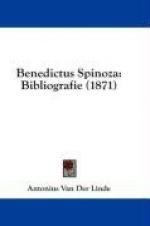|
This section contains 20,845 words (approx. 70 pages at 300 words per page) |

|
Dutch Jewish philosopher Benedict de Spinoza was best known for his Ethics (1677), which laid out in geometric form arguments for the existence of an impersonal God, the identity of mind and body, determinism, and a way of overcoming the dominance of the passions and achieving freedom and blessedness. His Theological-Political Treatise (1670) was a landmark in the history of biblical criticism. He was also, in that work, the first major philosopher in the Western tradition to argue for democracy and for freedom of thought and expression.
In the Port of Amsterdam (1632–1656)
Spinoza was born into the Portuguese Jewish community in Amsterdam in the same year Galileo published his Dialogue Concerning the Two Chief World Systems. His father, Michael, was an immigrant who had fled Portugal, with other members of his family, to escape the persecution of the Inquisition. At that time...
|
This section contains 20,845 words (approx. 70 pages at 300 words per page) |

|


